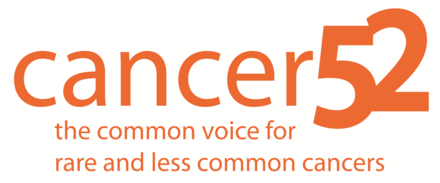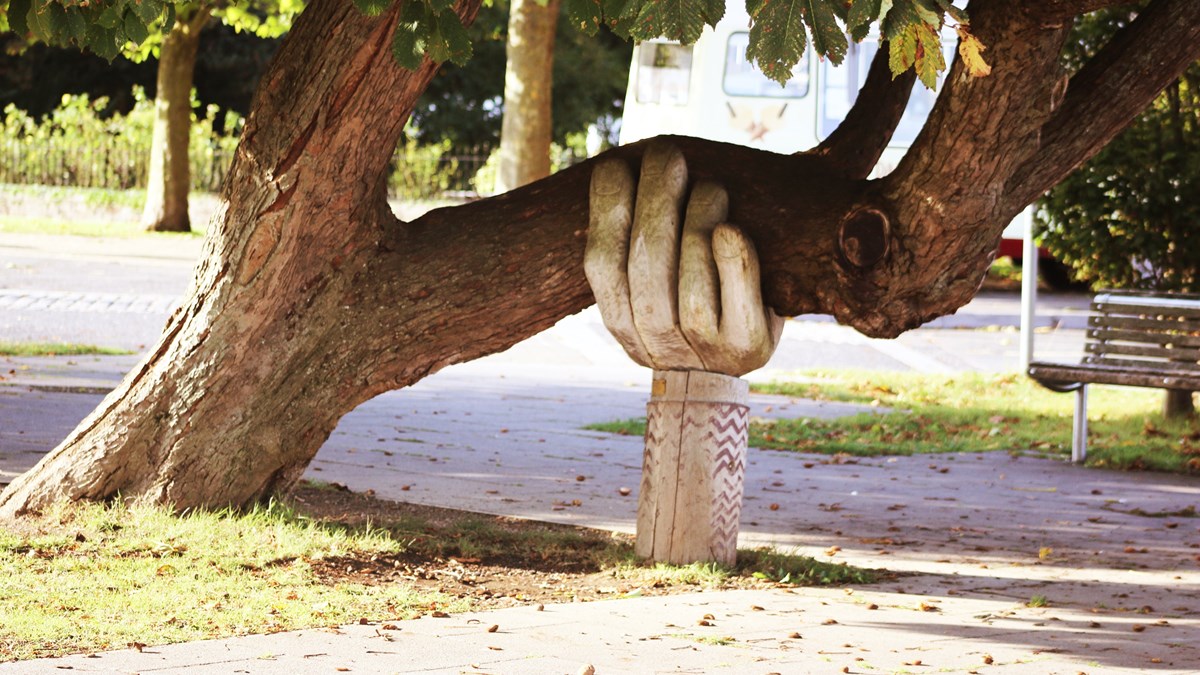Supporters, collaborators and memberships
Salivary Gland Cancer UK has a number of relationships with key national and international groups, all working to further research into rare salivary gland cancers.
We are keen to connect SGC UK with key groups within the cancer research community both in the UK and abroad.
We are members of several umbrella organisations in the UK such as Cancer52 and Rare Revolution. We in an advisory role at a European level for the EURACAN rare Head and Neck Cancer Domain. A key piece of work with EURACAN was the creation of the STARTER registry and you can hear a podcast about the project here.
We collaborate with other organisations both nationally and internationally, to provide signposting for appropriate patient and carer support and to further our goal of pushing forward research into these rare salivary gland cancers.
Further information on all of these organisations and our relationship with them, can be found below.
EURACAN: European Reference Network ('ERN') for Rare Adult Solid Cancers
European Reference Networks ('ERN's) are virtual networks involving European health care providers ('HCP's), Associate Partners (learned societies, EU/international organisations and other relevant stakeholders) and patient advocates whose goal is to share expertise and improve access to care for patients across the European Union, especially for complex or rare diseases requiring highly specialised health care and a concentration of knowledge and resources. EURACAN is the ERN for Rare Adult Solid Cancers.
EURACAN’s Objectives:
- Increase access to pathological diagnosis and associated treatments and information across all EU Member States for adult patients with rare solid cancers
- Develop medical training programmes to increase and harmonise quality of care
- Fully and pro-actively involve patient advocacy groups which support people with rare adult solid cancers and assist them in the wide dissemination of relevant information about these diseases through the use of educational tools, collaborative networks and other means
- Implement “roadmaps” for referral and self-referral of adults with rare solid cancers to expert centres
- Develop and continuously review Clinical Practice Guidelines (CPGs)
- Initiate and promote novel translational research programmes and associated tools (e.g. a set of multinational databases and tumour banks)
- Interact with key national and international medical specialists and networks involved in cancer care and research as well as interacting with other rare disease stakeholders
EURACAN groups all rare adult solid cancers into ten “domains” corresponding to the RARECARE classification and the ICD-O (which is a medical classification for cancer). These ten domains are also based on pre-existing successful collaborations, in particular for clinical research and expert networks which have been active in the last ten to twenty years. Patient representatives associated with EURACAN are called European Patient Advocacy Groups (ePAGs) and they work closely with the ten domains and EURACAN task force leaders to provide information and perspectives on patients’ needs and expectations. The ePAGs are coordinated by EURORDIS.
The G7 Domain is focused on: Rare neoplasm of the head and neck: salivary gland tumours, nasopharyngeal cancer, nasal and sinonasal cancers, middle ear (Rare Head and Neck domain)
Clinical Lead: Lisa LICITRA, Fondazione IRCCS Istituto, Nazionale dei Tumori, Milan, Italy
ePAG's: Emma Kinloch, Salivary Gland Cancer UK and Roberto Persio
EURACAN is one of the 24 European Reference Networks (ERNs) approved by the ERN Board of Member States. The ERNs are supported by the European Commission. For more information about the ERNs and the EU health strategy, please visit http://ec.europa.eu/health/ern. The content on this website represents the views of the network and is its sole responsibility; it can in no way be taken to reflect the views of the European Commission or any other body of the European Union.
'The European Reference Network for rare adult solid cancers, statement and integration to health care systems of member states: a position paper of the
ERN EURACAN' published ESMO Open August 2021, can be read here: European Reference Network for rare adult solid cancers, statement and integration to health care systems of member states: a position paper of the ERN EURACAN (esmoopen.com)
In November 2022 the 'Salivary gland cancer: ESMO European Reference Network on Rare Adult Solid Cancers (EURACAN) Clinical Practice Guideline for diagnosis, treatment and follow-up' were published. They can be accessed here.
You can also listen to a podcast about the creation of the STARTER registry here.
Adenoid Cystic Carcinoma Research Foundation ('ACCRF')
ACCRF’s mission is to accelerate the development of improved therapies and a cure for adenoid cystic carcinoma. The foundation’s global research activities span biobanking, model development, genomic studies, drug discovery and clinical trial design. ACCRF also supports the patient community through education about treatment options and patient gatherings. Emma is a Board member of the ACCRF.
National Cancer Research Institute ('NCRI') - now closed but we have taken on the Salivary Gland Cancer Working Group
The NCRI's purpose is to improve health and quality of life by accelerating progress in cancer-related research, through collaboration. It is a partnership of researcher funders who wish to achieve more by working together. NCRI Partner organisations collectively spend more than £490m on cancer research each year.
Salivary Gland Cancer UK is the result of a collaboration formed through NCRI involvement.
NCRI activities include a thriving annual conference, clinical studies groups ('CSG's) for researchers to collaborate on trial development, and a range of initiatives to boost activity within particular strands of research. The CSG's bring together clinicians, scientists, statisticians and lay representatives to coordinate development of a strategic portfolio of trials within their field. They all interact with clinical research networks, funders and researchers to develop studies aimed at improving outcomes for patients and provide the primary, but not sole, route through which new ideas for clinical trials are developed.
Dr Metcalf and Emma Kinloch are both members of the Head and Neck CSG.
http://csg.ncri.org.uk/about-the-csgs/clinical-studies-groups/head-and-neck/
One of the enablers of the NCRI strategy is the involvement of people affected by cancer at all stages of our work, helping them drive research forward and the NCRI invite patients, carers and others affected by cancer (also known as ‘consumers’) to participate in all aspects of NCRI’s work. At any one time, up to one hundred consumers will be involved in activities; making contributions to the setting of strategy and, through involvement in NCRI activities, shaping actions at national level as experts in the experience of cancer.
All consumers involved in the NCRI are members of the NCRI Consumer Forum. The forum aims to foster a vibrant and collaborative community to work with NCRI as partners in cancer research; exchanging knowledge and expertise in a coordinated way. Emma Kinloch is the Chair of the Consumer Forum and the Consumer Lead.
Industry Partners
Roche Products Limited:
SGC UK has worked on two collaborative projects with Roche:
International Rare Cancer Initiative ('IRCI'): Salivary Gland Cancer Group
The International Rare Cancers Initiative ('IRCI') was established early in 2011 to address the inferior outcomes for patients with rare cancers.
The IRCI is a joint initiative between Cancer Research UK (CRUK), the National Institute of Health Research Clinical Research Network: Cancer (NIHR CRN:Cancer), the National Cancer Institute (NCI), the European Organisation for Research and Treatment of Cancer (EORTC), the Institut National Du Cancer (INCa), Clinical Oncology Society of Australia (COSA), Japan Clinical Oncology Group (JCOG) and Canadian Cancer Trials Group.
The aim is to facilitate the development of international clinical trials for patients with rare cancers in order to boost the progress of new treatments for these patients. It hopes to encourage the use of innovative methodologies to maximise the potential for answering research questions and to identify and overcome barriers to international trials to allow international collaborative trials to run smoothly.
Salivary Gland Cancers are one of the nine rare cancers that are included in the initiative that have formed the core activities of IRCI to date. Dr Robert Metcalf is the lead UK clinician for Salivary Gland Cancers and Emma Kinloch is also a member.
Cancer52: The common voice for rare and less common cancers

Cancer52 is the common voice for rare and less common cancers who work to address the inequality that rare cancers such as salivary gland cancers are subject to. Rare cancers are severely under represented and under-funded across all areas including policy, services and research despite 54% of UK cancer deaths being from rare and less common cancers. Cancer52 is an alliance of over 100 organisations working to address this inequality and improve outcomes for patients with these highly challenging diseases.
Salivary Gland Cancer UK is a Cancer52 member, regularly participating in discussions, events and working with them towards our shared goals.
In October 2022 a 'Taking Action on Inequalities in Rare and Less Common Cancers: Understanding the Issues' report was launched. You can read the report here. Salivary Gland Cancer UK was a member of the working group who put this important report together.
Speekselklierkanker: The Patients Association Salivary Gland Cancer registered in Holland
The Dutch salivary gland cancer patient group hosts two in person patient meetings each year and have raised very significant funds to support the research of Dr. Carla van Herpen at Radboud University.
Dr. Carla van Herpen, internist-oncologist at the Radboudumc, during the first meeting Patient Association Salivary Gland Cancer 01 December 2015 stated:
" Let's make a fist together to give patients with salivary gland cancer a longer and better life."
https://speekselklierkanker.org/
The Patients Association Salivary Gland Cancer is registered at the Chamber of Commerce Arnhem under number 67920837
Rare Disease UK, a national campaign of Genetic Alliance UK
Salivary Gland Cancer UK is a member of Genetic Alliance UK, the national charity working to improve the lives of patients and families affected by genetic, rare and undiagnosed conditions. As a member, we are now joining an alliance of over 200 patient organisations. Genetic Alliance UK is also home to Rare Disease UK – the national campaign for people with rare diseases and all who support them – and SWAN UK (syndromes without a name), the only dedicated support network available for families of children and young adults with undiagnosed genetic conditions in the UK.
https://www.geneticalliance.org.uk/member/salivaryglandcanceruk/
EURORDIS-Rare Diseases Europe
EURORDIS-Rare Diseases Europe is a unique, non-profit alliance of 910 rare disease patient organisations from 72 countries that work together to improve the lives of the 30 million people living with a rare disease in Europe.
By connecting patients, families and patient groups, as well as by bringing together all stakeholders and mobilising the rare disease community, EURORDIS strengthens the patient voice and shapes research, policies and patient services.
EURORDIS supports the creation and development of rare disease national alliances and disease-specific European federations and networks.
Salivary Gland Cancer UK is a member since April 2020. You can access their website here.
EURORDIS Vision and Mission:
Our vision is to enable better lives and cures for people living with a rare disease.
Our mission is to work across borders and diseases to improve the lives of people living with a rare disease



To this end, EURORDIS undertakes activities on behalf of its members, notably in favour of:
- Empowering rare disease patient groups
- Advocating rare diseases as a public health issue
- Raising public rare disease awareness, and also that of national and international institutions
- Improving access to information, treatment, care, and support for people living with rare diseases
- Encouraging good practices in relation to these
- Promoting scientific and clinical rare disease research
- Developing rare disease treatments and orphan drugs
- Improving quality of life through patient support, social, welfare and educational services
Association of the British Pharmaceutical Industry ('ABPI')
In 2022 we collaborated with the ABPI on their report 'Harnessing the UK's genomics expertise to improve patient outcomes'. You can read the report here.
Emma Kinloch sits of their Patient Organisation Forum (POF) steering group.

